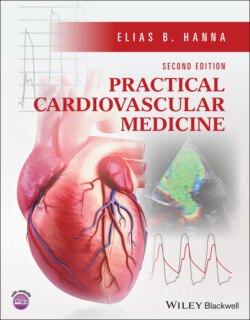Читать книгу Practical Cardiovascular Medicine - Elias B. Hanna - Страница 34
C. Anticoagulant therapy (see Appendix 4 for a detailed discussion)
ОглавлениеFour anticoagulants are considered in NSTE-ACS: (i) unfractionated heparin (UFH), (ii) enoxaparin, (iii) bivalirudin, and (iv) fondaparinux. Upon admission, anticoagulation with any one of these four drugs should be initiated (class I recommendation). During PCI, either UFH or bivalirudin is used (Figures 1.5, 1.6; Table 1.3).
In NSTEMI, the anticoagulant is not usually withheld before the catheterization procedure.
The dose of UFH used in NSTEMI is lower than the dose used in PE, with a PTT goal of 46–70 seconds. As cornerstone antiplatelet therapy is administered, moderate rather than high-level anticoagulation is appropriate for ischemic reduction in ACS and minimizes bleeding, which is a powerful prognostic marker in ACS.
Anticoagulants are typically stopped after the performance of PCI. If PCI is not performed, anticoagulants are typically administered for at least 48 hours (up to 8 days). Longer therapy reduces rebound ischemia, which mainly occurs with heparin.
In patients undergoing catheterization, upstream enoxaparin therapy is associated with a higher bleeding risk than UFH. Moreover, the switch between enoxaparin and UFH increases the bleeding risk and should be avoided. If the patient is going for an invasive strategy and the operator prefers not to use enoxaparin during PCI, the patient should receive UFH on admission, not enoxaparin.
During PCI, a switch from UFH to bivalirudin, or from fondaparinux to other anticoagulants has not shown harm.
Figure 1.5 Specific effects of the four anticoagulants.
A heparin derivative induces a conformational change in antithrombin III (AT III), which, according to the size of the heparin–AT III complex, predominantly inactivates Xa or the active thrombin. UFH inactivates thrombin preferentially, while low-molecular-weight heparin (LMWH) inactivates Xa preferentially. The smaller fondaparinux molecule inactivates Xa exclusively. The inactivation of Xa eventually inhibits thrombin generation rather than thrombin activity. Heparin activates platelets directly by binding to them, which also triggers antiplatelet antibodies (HIT).
The oral direct thrombin inhibitor (dabigatran) and the oral Xa antagonists (apixaban, rivaroxaban) are used to treat AF, not ACS.
Figure 1.6 Summary of anticoagulant use in NSTE-ACS, before catheterization and during PCI.
Operators who are not comfortable with performing PCI solely under the coverage of a prior subcutaneous dose of enoxaparin should avoid starting enoxaparin on admission and should use any of the other three agents upfront.
